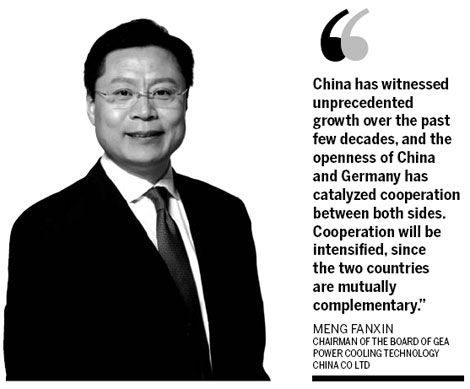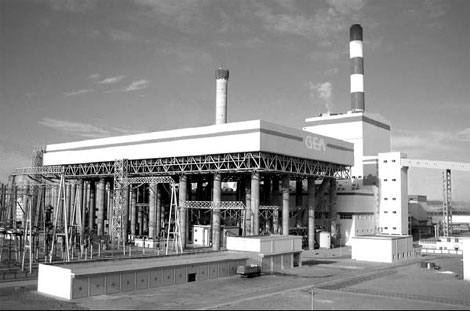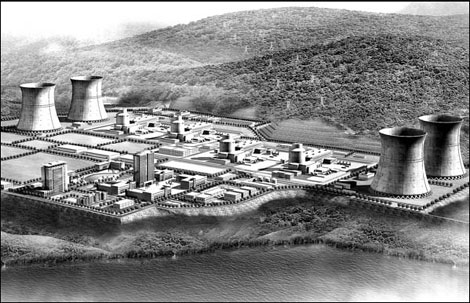GEA expands air cooling business in China
Updated: 2012-02-02 07:50
By Zhang Zhao (China Daily)
|
|||||||||||
|
Shaanxi Guohua Jinjie 4x600 mW coal-fired power project air cooled units. [Photos Provided to China Daily] |
|
CNNC Hunan Taohuajiang 4x1,000 mW nuclear power plant project. |
Technology and mutual cooperation would be the core values that a German company should offer to China if it seeks to expand on more trade in the Chinese market, a country filled with opportunities as well as challenges, said Meng Fanxin, chairman of the board of GEA Power Cooling Technology (China) Co Ltd.
Although a mid-sized company, Germany-based GEA is a world-leading developer of heat exchangers. The Chinese branch opened in 2003, while the company began operating in the country about 30 years ago.
It controls around 40 percent of the Chinese market of power plant cooling facilities, according to 2011 statistics, and owns more than 80 percent of the patents of air-cooling technology in the world, since it is recognized as the inventor of air-cooling technology.
The greatest technical advantage of the cooling equipment is its high efficiency that maximizes power generation while minimizing carbon discharges and water consumption at large power plants, according to Meng.
Traditional thermal power plants utilize water-cooling that requires large amounts of water that impact agriculture and people's livelihoods in arid regions of Northwest China.
GEA's air-cooling system allows thermal power plants to function in the desert, because it saves nearly 80 percent in water usage.
"We are selling eco-friendly equipment to China, and introducing the latest technology," Meng said.
North China's Langfang city in Hebei province is GEA's global manufacturing base, since the city is considered "to be an investor-friendly trade zone offering numerous financial and tax benefits, along with an abundance of highly skilled labor," he said.
Langfang is located in a port zone that enables its products to access many international markets including Australia, the United States and Europe, he added.
GEA is the contractor of the Taohuajiang Nuclear Power Plant cooling tower in Central China's Hunan province, which was built "the safest and largest nuclear power generation units in the world."
The project has been deemed a milestone in global development in the ultra-large nuclear power cooling tower sector, the first one of its kind built in China's inland area.
The cooling tower stands 200 meters tall with a 160 m diameter, which is the largest in the world.
The chairman said the project uses efficient GEA natural draft wet-cooling technology that "enhances the cost efficiency and safe power generation features of the plant."
GEA recognizes that a partnership with Chinese companies provides "reciprocal benefits" - rapid expansion of turnover by improving competitiveness in the Chinese and global markets.
"In each and every sales contract GEA signs up a design liaison relationship that establishes highly-skilled and qualified local Power Design Institutes, whereby the joint development and optimization of our power plant cooling products can become fully realized.
"Apart from commercial cooperation when selling our equipment to thermal power plants that are built here, GEA plays a vital role in supporting feasibility studies jointly run by Chinese nuclear engineering institutes in dealing with the application of water and power saving dry cooling systems for safe nuclear power plants."
"China has witnessed unprecedented growth over the past few decades, and the openness of China and Germany has catalyzed cooperation between both sides," said Meng.
"Cooperation will be intensified, since the two countries are mutually complementary."
"Germany is a leader in the technology field, but China has a large consumer market," he said. "The Chinese economy and Chinese companies have unique characteristics. We can't say which is better than the other, but we can learn from each other via communication and exchange programs."
GEA is regarded more as a "home-grown company with Chinese characteristics that provides technology and services for our customers and the needs of the market," said Meng.
"Even though the two countries have vastly different backgrounds related to culture and industry, China and Germany share the same goal of seeking a better environment, greener energy, more stable economy and higher quality of life standards." Hence, Meng sees the two countries as friends, not future rivals.

Today's Top News
President Xi confident in recovery from quake
H7N9 update: 104 cases, 21 deaths
Telecom workers restore links
Coal mine blast kills 18 in Jilin
Intl scholarship puts China on the map
More bird flu patients discharged
Gold loses sheen, but still a safe bet
US 'turns blind eye to human rights'
Hot Topics
Lunar probe , China growth forecasts, Emission rules get tougher, China seen through 'colored lens', International board,
Editor's Picks

|

|

|

|

|

|







